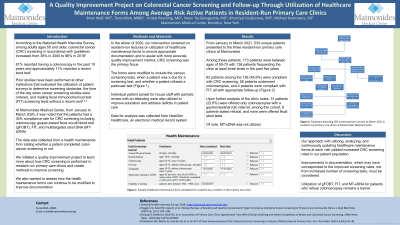Back


Poster Session A - Sunday Afternoon
Category: Colorectal Cancer Prevention
A0166 - A Quality Improvement Project on Colorectal Cancer Screening and Follow-Up Through Utilization of Healthcare Maintenance Forms Among Average Risk Active Patients in Resident Run Primary Care Clinics
Sunday, October 23, 2022
5:00 PM – 7:00 PM ET
Location: Crown Ballroom

Has Audio

Brian Wolf, MD
Maimonides Medical Center
Sherman Oaks, CA
Presenting Author(s)
Brian Wolf, MD, Varun Tej Gonuguntla, MD, Kristal Pouching, MD, Khurriyat Foziljonova, MD, Tania Miah, MBBS, Michael Kantrowitz, DO
Maimonides Medical Center, Brooklyn, NY
Introduction: Among adults ages 50 and older, colorectal cancer (CRC) screening in accordance with guidelines increased from 38% in 2000 to 66% in 2018; 61% reported having a colonoscopy in the past 10 years and approximately 11% reported a recent stool test. At Maimonides Medical Center, from January to March 2020, it was noted that the patients between ages 50-75 had a 34% compliance rate for CRC screening including colonoscopy, guaiac-based fecal occult blood test (gFOBT), fecal immunochemical test (FIT), and multitargeted stool DNA (MT-sDNA). We initiated a quality improvement project to learn more about how CRC screening is performed in resident-run primary care clinics and create methods to improve screening.
Methods: In the winter of 2020, our intervention centered on resident-run lectures to promote the utilization of healthcare maintenance forms to ensure appropriate documentation and to assist with more accurate quality improvement metrics when treating patients in the primary care clinics; CRC screening was the primary focus. The forms indicated when a patient was due for a screening test and whether a patient refused a particular test. Individual patient panels for house staff with periodic review with an attending were also utilized to improve education and address deficits in patient care. Data for analysis was collected from NextGen Healthcare, an electronic medical record system.
Results: From January to March 2021, 534 unique patients presented to the three resident-run primary care clinics at Maimonides. Among these patients, 173 patients were between ages of 50-75 with 136 patients frequenting the clinic at least three times in the past five years. 62 patients among the 136 (45.6%) were compliant with CRC screening; 58 patients underwent colonoscopies, and 4 patients were compliant with FIT, all with appropriate follow-up. 31 patients (22.8%) were offered only colonoscopies with a gastrointestinal (GI) referral; among this cohort, 8 patients stated refusal, and none were offered fecal stool tests. Of note, MT-sDNA was not utilized.
Discussion: Our approach with utilizing, analyzing, and continuously updating healthcare maintenance forms at each visit yielded increased CRC screening rates in our patient population. Utilization of gFOBT, FIT, and MT-sDNA for patients who refuse colonoscopies remains a barrier.
Disclosures:
Brian Wolf, MD, Varun Tej Gonuguntla, MD, Kristal Pouching, MD, Khurriyat Foziljonova, MD, Tania Miah, MBBS, Michael Kantrowitz, DO. A0166 - A Quality Improvement Project on Colorectal Cancer Screening and Follow-Up Through Utilization of Healthcare Maintenance Forms Among Average Risk Active Patients in Resident Run Primary Care Clinics, ACG 2022 Annual Scientific Meeting Abstracts. Charlotte, NC: American College of Gastroenterology.
Maimonides Medical Center, Brooklyn, NY
Introduction: Among adults ages 50 and older, colorectal cancer (CRC) screening in accordance with guidelines increased from 38% in 2000 to 66% in 2018; 61% reported having a colonoscopy in the past 10 years and approximately 11% reported a recent stool test. At Maimonides Medical Center, from January to March 2020, it was noted that the patients between ages 50-75 had a 34% compliance rate for CRC screening including colonoscopy, guaiac-based fecal occult blood test (gFOBT), fecal immunochemical test (FIT), and multitargeted stool DNA (MT-sDNA). We initiated a quality improvement project to learn more about how CRC screening is performed in resident-run primary care clinics and create methods to improve screening.
Methods: In the winter of 2020, our intervention centered on resident-run lectures to promote the utilization of healthcare maintenance forms to ensure appropriate documentation and to assist with more accurate quality improvement metrics when treating patients in the primary care clinics; CRC screening was the primary focus. The forms indicated when a patient was due for a screening test and whether a patient refused a particular test. Individual patient panels for house staff with periodic review with an attending were also utilized to improve education and address deficits in patient care. Data for analysis was collected from NextGen Healthcare, an electronic medical record system.
Results: From January to March 2021, 534 unique patients presented to the three resident-run primary care clinics at Maimonides. Among these patients, 173 patients were between ages of 50-75 with 136 patients frequenting the clinic at least three times in the past five years. 62 patients among the 136 (45.6%) were compliant with CRC screening; 58 patients underwent colonoscopies, and 4 patients were compliant with FIT, all with appropriate follow-up. 31 patients (22.8%) were offered only colonoscopies with a gastrointestinal (GI) referral; among this cohort, 8 patients stated refusal, and none were offered fecal stool tests. Of note, MT-sDNA was not utilized.
Discussion: Our approach with utilizing, analyzing, and continuously updating healthcare maintenance forms at each visit yielded increased CRC screening rates in our patient population. Utilization of gFOBT, FIT, and MT-sDNA for patients who refuse colonoscopies remains a barrier.
Disclosures:
Brian Wolf indicated no relevant financial relationships.
Varun Tej Gonuguntla indicated no relevant financial relationships.
Kristal Pouching indicated no relevant financial relationships.
Khurriyat Foziljonova indicated no relevant financial relationships.
Tania Miah indicated no relevant financial relationships.
Michael Kantrowitz indicated no relevant financial relationships.
Brian Wolf, MD, Varun Tej Gonuguntla, MD, Kristal Pouching, MD, Khurriyat Foziljonova, MD, Tania Miah, MBBS, Michael Kantrowitz, DO. A0166 - A Quality Improvement Project on Colorectal Cancer Screening and Follow-Up Through Utilization of Healthcare Maintenance Forms Among Average Risk Active Patients in Resident Run Primary Care Clinics, ACG 2022 Annual Scientific Meeting Abstracts. Charlotte, NC: American College of Gastroenterology.
